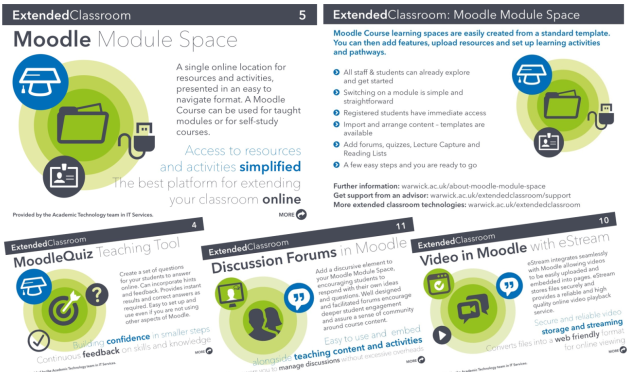Jisc is consulting priorities for co-design programmes, and one of the themes is next generation learning environments #ngdle #codesign16
If you don’t know me: I manage the central Academic Technology team at the University of Warwick, and prior to that I’ve worked in educational technology since 1999, including two stints at Jisc. I’m very aware of the history of VLEs and the openness agenda. I work in an IT services context as well as in an academic development context, with lots of great people. Learning Environments are at the heart of what we do, and we use the Extended Classroom concept as an umbrella for the shared institutional infrastructure and support at Warwick.
So, there is a co-design consultation about learning environments and I have got nowhere close to reading all the responses so far. I’d be very glad of suggestions for people saying things similar to what follows. Please do comment. I plan to join in the tweet chat on 22nd November.
Here’s my tuppence-worth …
I feel driven to write this because I don’t recognise what a lot of people are saying.
Some of the criticisms of VLEs are criticisms of curriculum approach. Some are criticisms of even what we teach, let alone how. Sure, these issues come up in discussions about teaching and about technology-enhanced learning. I haven’t yet seen a compelling description of exactly what’s wrong with VLEs at the moment.
Some of the criticisms of what’s wrong with teaching come from disciplines where unbounded and exploratory learning have an important role in the knowledge model. Voices from Education and Sociology are loud. Voices from Humanities subjects on the impossibility and danger of an over-prescriptive curriculum are loud. What about engineering? chemistry? archaeology? medicine? law? Disciplines with a lot of foundational knowledge, or with external accreditation bodies? These are as much part of Universities as philosophy and literature (my degree, for what it’s worth!). Are those voices saying the same thing? Or are they being drowned out?
And another thing … part of the criticisms levelled at the VLE are that it is a tool of mass education. Ditto lecture capture is a tool of mass education. Yes they are. We have mass higher education. Would you like to choose which students you would have turned away in the interests of smaller class sizes? Ouch!
I’d love for someone to do a literature review of how many TEL approach pilots/evaluations are of small groups. In education. Involving postgrads. I just don’t think the voices that are loudest are representative of the whole scope of what’s done in HE.
So … sometimes VLEs are criticised for supporting bounded, prescriptive, functional, vocational mass education. Which is kind of like criticising a hammer for being good at putting nails in the wall.
Let’s look at more criticisms about VLEs
People criticise VLEs for feeling like clunky old technology
I agree.
The VLE paradigm comes from the late 90s in an era where online interactivity was hard. These days it possible to add interactivity, social interaction and all kinds of clickety clickety action into webpages. Then it needed something that felt like a system. VLEs look like Content Management Systems (CMS) rather than the front end webpages produced by CMSs. It probably derives from them being swiss army knives (as someone commented already). Does it sometimes feel like VLEs are clunky interface design? Yes.
Point accepted.
People criticise VLEs for being systems you have to learn
I disagree.
Expert systems are part of life. If you want to do online banking you need to get used to online banking. If you work in a company you need to get used to their systems. I don’t see a problem with students having to learn their way around a VLE. Actually I think it’s a skill that everybody should have. Websites should be intuitive. Expert systems might not be.
But sometimes the reason they are difficult to navigate is bad information design. And that’s because there are not enough people there to help with creating useful digital spaces. And sometimes its because academic staff want to make their own choices about where content goes. Soft-engineering through templates and locked down sections can be seen as prescriptive. Is that a freedom worth fighting for?
People criticise VLEs for being manifestations of institutional structures that restrict access
But …
VLEs are about restricting access to specific online resources to specific people for specific periods of time. I think That’s The Point of VLEs. If we accept that part of their function is to bring the right people together at the right time, maybe we should look to new technological models to do that. I can imagine a VLE which is actually a framework that glues together activities and content hosted on best-of-breed tools. This is what LTI begins to do. VLE as a shared service identity provider. Couldn’t the VLE be a point of authentication of individuals and groups into a wide variety of tools and spaces? The VLE as identity provider and portal.
Three reasons why the university should be a gatekeeper:
- The university buys access to software, tools and content on behalf of learners and it needs to manage access. That’s how publishers and software companies work.
- There is value in institutional identities instead of facebook or google. Why should a student have to connect their personal selves to their student selves? The institutional identifier is the lowest common denominator and allows for people to participate without them having to attach their other identities.
- If we leave self-organising entirely to students then those with the most “social capital” will thrive. Yes everyone should learn to operate and thrive in a messy world, but we surely need to scaffold it to bring some parity to the starting points? Isn’t it fairer to facilitate students into groups and spaces to at least give a fair start?
But wait, am I saying all teaching should take place behind closed digital doors. No. Academics have autonomy and discretion to direct students to anywhere on the web for content and experience. They do need to ensure that assessment is fair though. Where the wild wild web meets the process of assessment, issues of ethics, inclusion and practicality come in. That’s about assessment design.
So I think the Next Generation Learning Environments should be a shared service identity provider, to glue together the right people in the right spaces at the right time.
Hang on a minute anyway … this is all about digital activities. The term learning environments means physical classrooms too.
Good point.
This is where Dave White’s term “Coalescent Spaces” comes in.
And the concept of “polysynchronous” :
“Polysynchronous learning refers to a mix of face-to-face, asynchronous, and synchronous channels of online communication; participation by students in diverse locations is cited as a key benefit. It requires physical classrooms to be designed to enable students to seamlessly communicate with others face-to-face and virtually”
via New Media Consortia 2016 HE report, p12. Citing a post “everything you need to know about designing polysynchronous learning spaces“.
What does this mean?
So, 2020. I’m in the room. The academic is lecturing, I’ve had access to the notes and to some commercially sensitive content in advance. I’m annotating the livestream where I want to listen again. I can see online who else is in the room. My planner tells me I’ll have 15 minutes to get to the next session, and it shows me the coffee shop on route. I ping my tutorial friends who wants to walk over with me?
It’s not a revolution, but it’s helpful. And it’s possible!
Students, alone and together, with staff, in physical and virtual spaces. Blending the online and offline social aspects. Without everyone having to give their facebook identity or google identity into the mix. Because institutional learning environments should be smart, flexible and inclusive.
Thanks for reading
Addendum
21/11/16 16:00 things I forgot to include on the original post:
- I knew i’d forget something: the environment needs to allow staff and students to manage presence/availability in smart ways. i think presence-management is a key capability for digital wellbeing
- It might be that users can sign up to a notifications service if they want to: google now or something i-ish, but it’s their choice and the Learning Environment just integrates with it. I don’t intend that we should DIY-build the whole stack. But it should be possible to maintain an institutional identity as far as everyone else is concerned, even if the user plugs it into another service for their convenience.


